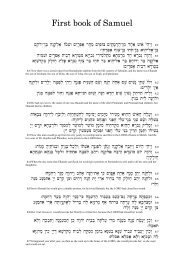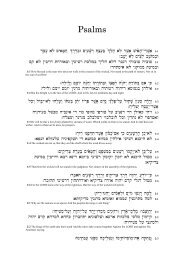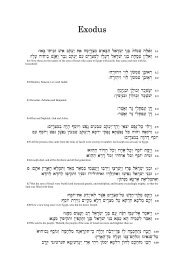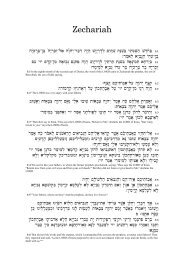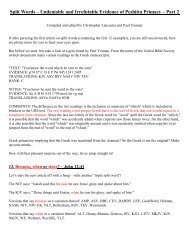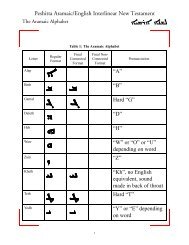ana translation
Untitled - Peshitta Aramaic/English Interlinear New Testament
Untitled - Peshitta Aramaic/English Interlinear New Testament
- No tags were found...
Create successful ePaper yourself
Turn your PDF publications into a flip-book with our unique Google optimized e-Paper software.
2 JOH. 10-13]<br />
SUPPLEMENTAL NOTES. 121<br />
12345 (corr.): 9 12, hkl, LN, om : 5* 7 8 10 11<br />
13 14 15*17 19 20, HP A, add ^0<br />
: 18 subst (kc.).<br />
Thus (neglecting the aberration of<br />
18) there are three readings:<br />
(a] *,I!A tjipKjO, (6) wi r*AO simply, (c) wip^O ^ .j^O. It seems probable<br />
that (c),<br />
the reading of most of the later copies (joined by 14 and<br />
others), is merely a conflation of (a) with It (6). may well be that<br />
Philox. originally expressed ^a/peiv by ^ ^ rx (a) ;<br />
that some editor, for<br />
greater accuracy (perhaps after the example of HarkL), left out (b) the<br />
CTOL<br />
j*\<br />
not being expressed in the Gr. , ;<br />
and that later copyists, with<br />
no Gr. authority, combined the two (c). Etzel, followed by Pococke, tries<br />
to give meaning to the reiteration of -> r >j by rendering " ave et vale ";<br />
Arab, similarly; also Schaaf, "salve tibi et vale"; but Polygl., less<br />
plausibly, "laetare frowoque sis animo" These <strong>translation</strong>s, and the<br />
editions except (as above) L N, follow the later copies, and read as (c).<br />
11. The shapJiel form ^LQ.mLo (= /cotvwvet),<br />
which I adopt<br />
on the<br />
authority of 1 alone, is rare; else in Pesh. N.T. only Act. vii. 61<br />
(= crwcuSoKcoi/). All other copies, with Harkl., use the ordinary<br />
eshtapJiel form *2>2oAmSo, which conjugation is the one usually employed<br />
in rendering KOIVWI/W in Pesh. and Harkl. alike. On the<br />
authority of Thes. Syr. (s.v.) I write the last syllable with not ~.<br />
,<br />
12. Our translator uses the verb |lO to render /?ovXo/uu here; and<br />
in the parallel, 3 Joh. 13, to render tfe'Aw (if<br />
he so read that verse) ;<br />
Harkl., with more precision, while he uses |lS here, writes ID<br />
O<br />
. for<br />
0e'A.o) there. But both versions render /?ou'Ao/xcu by ]^t instead of<br />
V^D, 2 Pet. iii. 9 and Jud. 5.<br />
13. All texts of Philox., with all Gr., read "U<br />
(= dffTra^erat ere ra reWa) ; while Harkl. substitutes<br />
]i1 ; S) (= do-Tra^ov ra T.),<br />
with Ethiop. alone ;<br />
but in the marg. he (u)<br />
inserts the ordinary reading (whether from Philox. or from a Gr.<br />
exemplar). [Correct here the Syr. text (p. 26), where 1 *^ is<br />
wrongly<br />
printed for<br />
^vl).]<br />
II. The closing salutation before ^iVV), ^QOSni IZo^i (= fj ^apts<br />
/u,era o-ov), is not given by any of our older codices except 2, nor in<br />
12, 19, 20; and 5 has it only on marg. (writing uLOSo^) ;<br />
Arab, also<br />
omits it. But all the other later copies, and 2, with Etzel and the<br />
Polyglots, insert it, followed by all editions. It is very weakly supported<br />
by Gr. evidence, of a few cursives only ; Harkl., however,<br />
Q



